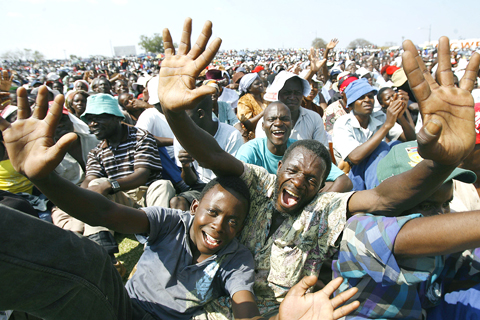The EU said on Sunday it would not remove sanctions targeting longtime Zimbabwean President Robert Mugabe and his loyalists or resume development aid until more has been done to implement a year-old power-sharing agreement and protect human rights.
Winding up the first visit by a high-level EU delegation since 2002, European Commissioner for Development and Humanitarian Aid Karel de Gucht said sharp differences remained between Mugabe and Prime Minister Morgan Tsvangirai, the former opposition leader, over their coalition agreement.
“They do not have the same reading of the same document. They have a different reading on how this should be done and at what speed,” he told reporters at the end of a two-day visit.

PHOTO: AFP
International Cooperation Minister Gunilla Carlsson of Sweden, which holds the rotating EU presidency, said the delegation’s talks with Mugabe were “open and frank.”
But traditional ties between the 27-nation bloc and Zimbabwe, severed over the expulsion of an EU election monitoring mission in 2002 and surging political violence at the time, remained on hold.
“We still have a lot of reports of human rights violations that are unacceptable,” she said.
The EU has protested continuing arrests and harassment of members of the Movement for Democratic Change — Tsvangirai’s political party that shares power with Mugabe’s ZANU-PF.
The EU has also criticized efforts by Mugabe’s party to block the appointment of a new attorney general, regional governors and the head of Zimbabwe’s central bank.
Carlsson said the slow pace of restoring the rule of law and the implementation of democratic, constitutional and media reforms were among several concerns raised with coalition leaders.
Mugabe says international sanctions, which the EU calls “restrictive measures,” hold back progress in rebuilding the country.
The EU has imposed a European travel ban on 203 senior Zimbabwean government officials, including Mugabe.
Their assets have also been frozen in the EU, as well as those of 40 companies with links to Mugabe and ZANU-PF.

Kehinde Sanni spends his days smoothing out dents and repainting scratched bumpers in a modest autobody shop in Lagos. He has never left Nigeria, yet he speaks glowingly of Burkina Faso military leader Ibrahim Traore. “Nigeria needs someone like Ibrahim Traore of Burkina Faso. He is doing well for his country,” Sanni said. His admiration is shaped by a steady stream of viral videos, memes and social media posts — many misleading or outright false — portraying Traore as a fearless reformer who defied Western powers and reclaimed his country’s dignity. The Burkinabe strongman swept into power following a coup in September 2022

‘FRAGMENTING’: British politics have for a long time been dominated by the Labor Party and the Tories, but polls suggest that Reform now poses a significant challenge Hard-right upstarts Reform UK snatched a parliamentary seat from British Prime Minister Keir Starmer’s Labor Party yesterday in local elections that dealt a blow to the UK’s two establishment parties. Reform, led by anti-immigrant firebrand Nigel Farage, won the by-election in Runcorn and Helsby in northwest England by just six votes, as it picked up gains in other localities, including one mayoralty. The group’s strong showing continues momentum it built up at last year’s general election and appears to confirm a trend that the UK is entering an era of multi-party politics. “For the movement, for the party it’s a very, very big

ENTERTAINMENT: Rio officials have a history of organizing massive concerts on Copacabana Beach, with Madonna’s show drawing about 1.6 million fans last year Lady Gaga on Saturday night gave a free concert in front of 2 million fans who poured onto Copacabana Beach in Rio de Janeiro for the biggest show of her career. “Tonight, we’re making history... Thank you for making history with me,” Lady Gaga told a screaming crowd. The Mother Monster, as she is known, started the show at about 10:10pm local time with her 2011 song Bloody Mary. Cries of joy rose from the tightly packed fans who sang and danced shoulder-to-shoulder on the vast stretch of sand. Concert organizers said 2.1 million people attended the show. Lady Gaga

SUPPORT: The Australian prime minister promised to back Kyiv against Russia’s invasion, saying: ‘That’s my government’s position. It was yesterday. It still is’ Left-leaning Australian Prime Minister Anthony Albanese yesterday basked in his landslide election win, promising a “disciplined, orderly” government to confront cost-of-living pain and tariff turmoil. People clapped as the 62-year-old and his fiancee, Jodie Haydon, who visited his old inner Sydney haunt, Cafe Italia, surrounded by a crowd of jostling photographers and journalists. Albanese’s Labor Party is on course to win at least 83 seats in the 150-member parliament, partial results showed. Opposition leader Peter Dutton’s conservative Liberal-National coalition had just 38 seats, and other parties 12. Another 17 seats were still in doubt. “We will be a disciplined, orderly